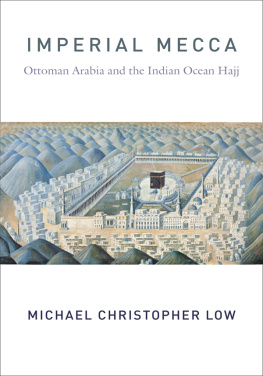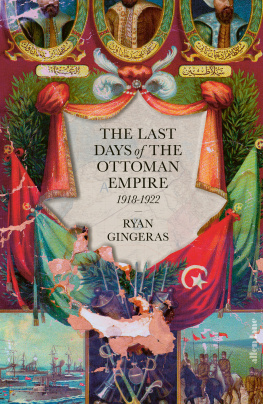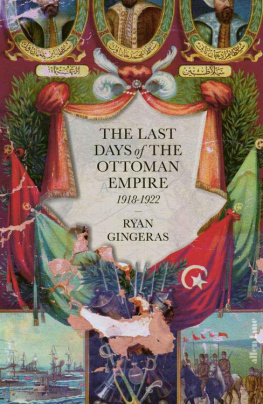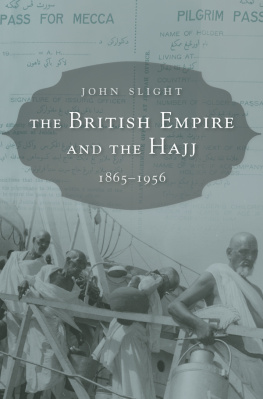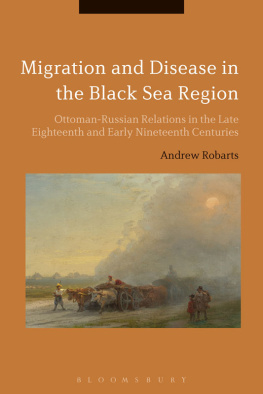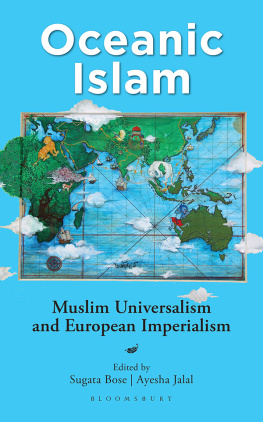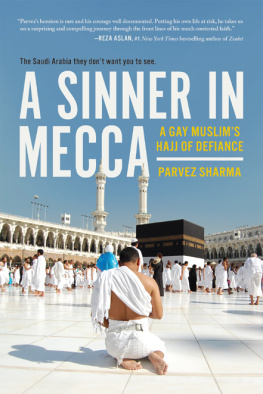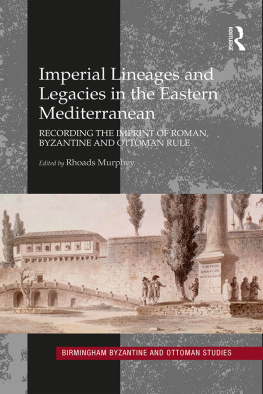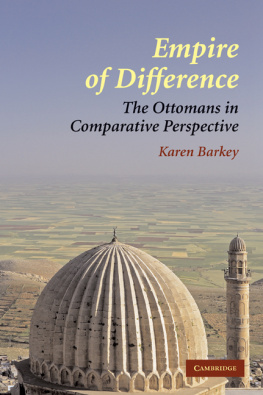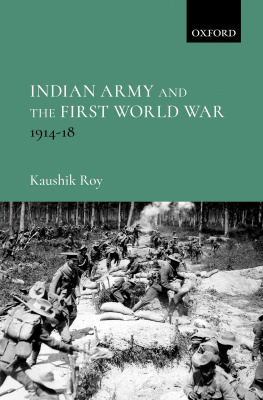Table of Contents
Imperial Mecca
COLUMBIA STUDIES IN INTERNATIONAL AND GLOBAL HISTORY
COLUMBIA STUDIES IN INTERNATIONAL AND GLOBAL HISTORY
Cemil Aydin, Timothy Nunan, and Dominic Sachsenmaier, Series Editors
This series presents some of the finest and most innovative work coming out of the current landscapes of international and global historical scholarship. Grounded in empirical research, these titles transcend the usual area boundaries and address how history can help us understand contemporary problems, including poverty, inequality, power, political violence, and accountability beyond the nation-state. The series covers processes of flows, exchanges, and entanglementsand moments of blockage, friction, and fracturenot only between the West and the Rest but also among parts of what has variously been dubbed the Third World or the Global South. Scholarship in international and global history remains indispensable for a better sense of current complex regional and global economic transformations. Such approaches are vital in understanding the making of our present world.
Cemil Aydin, The Politics of Anti-Westernism in Asia: Visions of World Order in Pan-Islamic and Pan-Asian Thought
Adam M. McKeown, Melancholy Order: Asian Migration and the Globalization of Borders
Patrick Manning, The African Diaspora: A History Through Culture
James Rodger Fleming, Fixing the Sky: The Checkered History of Weather and Climate Control
Steven Bryan, The Gold Standard at the Turn of the Twentieth Century: Rising Powers, Global Money, and the Age of Empire
Heonik Kwon, The Other Cold War
Samuel Moyn and Andrew Sartori, eds., Global Intellectual History
Alison Bashford, Global Population: History, Geopolitics, and Life on Earth
Adam Clulow, The Company and the Shogun: The Dutch Encounter with Tokugawa Japan
Richard W. Bulliet, The Wheel: Inventions and Reinventions
Simone M. Mller, Wiring the World: The Social and Cultural Creation of Global Telegraph Networks
Will Hanley, Identifying with Nationality: Europeans, Ottomans, and Egyptians in Alexandria
Perin E. Grel, The Limits of Westernization: A Cultural History of America in Turkey
Dominic Sachsenmaier, Global Entanglements of a Man Who Never Traveled: A Seventeenth-Century Chinese Christian and His Conflicted Worlds
Perrin Selcer, The UN and the Postwar Origins of the Global Environment: From World Community to Spaceship Earth
Ulbe Bosma, The Making of a Periphery: How Island Southeast Asia Became a Mass Exporter of Labor
Raja Adal, Beauty in the Age of Empire: Japan, Egypt, and the Global History of Aesthetic Education
Mona L. Siegel, Peace on Our Terms: The Global Battle for Womens Rights After the First World War
Nicole CuUnjieng Aboitiz, Asian Place, Filipino Nation: A Global Intellectual History of the Philippine Revolution, 18871912
IMPERIAL MECCA
Ottoman Arabia and the Indian Ocean Hajj
MICHAEL CHRISTOPHER LOW
COLUMBIA UNIVERSITY PRESSNEW YORK
Columbia University Press
Publishers Since 1893
New York Chichester, West Sussex
cup.columbia.edu
Copyright 2020 Columbia University Press
All rights reserved
E-ISBN 978-0-231-54909-7
Library of Congress Cataloging-in-Publication Data
Names: Low, Michael Christopher, author.
Title: Imperial Mecca : Ottoman Arabia and the Indian Ocean hajj / Michael Christopher Low.
Description: New York : Columbia University Press, 2020. | Series: Columbia studies in international and global history | Includes bibliographical references and index.
Identifiers: LCCN 2020001931 (print) | LCCN 2020001932 (ebook) | ISBN 9780231190763 (cloth) | ISBN 9780231190770 (paperback) | ISBN 9780231549097 (ebook)
Subjects: LCSH: Muslim pilgrims and pilgrimagesSaudi ArabiaMecca. | Muslim pilgrims and pilgrimagesIndian Ocean Region. | Hejaz (Saudi Arabia)History. | Great BritainRelationsSaudi Arabia. | Saudi ArabiaRelationsGreat Britain. | Great BritainForeign relationsTurkey. | TurkeyForeign relationsGreat Britain.
Classification: LCC BP187.3 .L69 2020 (print) | LCC BP187.3 (ebook) | DDC 297.3/524dc23
LC record available at https://lccn.loc.gov/2020001931
LC ebook record available at https://lccn.loc.gov/2020001932
A Columbia University Press E-book.
CUP would be pleased to hear about your reading experience with this e-book at .
Cover image: Panoramic View of the City of Mecca, by Shawkat/evket. Turkey, dated 1341 A.H. (19221923). Khalili Family Trust, the Khalili Collections, Hajj and the Arts of Pilgrimage (7002000), MSS 1163.
Cover design: Chang Jae Lee
For Cari, Annabelle, and Josie
Contents
AT ITS CORE, this book is a transregional, connective, and comparative study. It situates the Hijaz and Arabian Red Sea littoral between two rival imperial powers, the Ottomans and the British. From a spatial perspective, the Hijaz appears as a liminal borderland between the Ottoman Empires Arab frontiers and a British-dominated Indian Ocean. In order to represent some facsimile of the transregional, multiethnic, and multilinguistic texture of this time and place, the pages of this book are populated by a dizzying mlange of Ottoman officials, Arabs, Europeans, Indians, Jawis, and diasporic Hadramis. To strike a balance between these overlapping worlds, I conducted the bulk of my research at the Babakanlk Osmanl Arivi (now the Trkiye Cumhuriyeti Cumhurbakanl Devlet Arivleri) in Istanbul and the National Archives of the United Kingdom (formerly the Public Record Office) at Kew. In addition to these two main collections, I also used the British Librarys Asia, Pacific, and Africa Collections (India Office Records) and the Thomas Cook Group Archives (now part of the Record Office for Leicestershire, Leicester and Rutland). I was also fortunate to be invited to examine a private collection of letters, photographs, and ephemera held by the Khalili Family Trusts Hajj and the Arts of Pilgrimage Collection. In Istanbul I also made use of the Beyazt Devlet Ktphanesi and the slam Aratrmalar Merkezi (SAM).
This book draws on archival and published primary and secondary sources in Ottoman Turkish, modern Turkish, and Arabic. In translating and transliterating these materials, in general I have been faithful to the International Journal of Middle East Studies transliteration guidelines. Where feasible, I have tried to make terms from these languages as accessible as possible to nonspecialist readers. Thus when Turkish or Arabic words have been adopted widely in English, I have opted for the commonly understood English versionfor example, hajj, not ajj or hacc; sharif, not sharf or erif; pasha, not paa; and jihad, not jihd or cihad.
Because Ottoman and modern Turkish are the primary research languages featured throughout this study, I have opted for Turkish rather than Arabic spellings of technical terms, legal concepts, and governmental jargon. However, in some cases I have also deployed Arabic terminologies and spellings.
For place names I have generally opted for spellings most commonly adopted in English. Likewise, place names follow their primary linguistic affiliation. Thus for Arabic-speaking places I have opted for Jeddah, not Cidde, and Hijaz instead of Hicaz.

